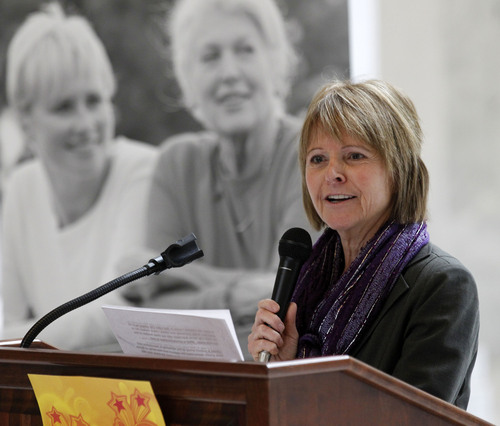This is an archived article that was published on sltrib.com in 2014, and information in the article may be outdated. It is provided only for personal research purposes and may not be reprinted.
A young Utah man was abusing drugs, unemployed and spinning "out of control" when his mother called him in crisis.
His grandfather, who has Alzheimer's disease, had been abruptly abandoned by another relative and needed help. So he moved into his grandfather's Utah County home and went "cold turkey" off drugs.
The first week was "the worst physical week of my life, because of the withdrawals," he remembers. "We would both wake up in the morning and go to eat our breakfast and we would both be trembling."
He was overwhelmed, but a sense of connection sustained him, he told University of Utah finance student Steven Clark.
"If I get frustrated, I can look into the sparkling blue eyes I inherited and his sad face, and then I go, 'OK, he needs me.' "
Now drug-free and moving on, he feels caregiving transformed him.
"There's no way around it," he says. "I dedicated a portion of my life to him, but he saved mine."
The young man, who requested anonymity, shared his story with Clark, one of 10 students at the U. who participated in a two-semester exploration of dementia through science, music, interviews and writing.
The Honors College project included collecting student essays about their family interviews into a book, "Framing Dementia," which is being released Wednesday. It aims to ease the stigma families coping with dementia feel, offer support and educate the community.
The book shows patients and families "they are not alone in the feelings and challenges they face" and that "there can be high quality of life throughout the illness," Norman Foster, director of the U.'s Center for Alzheimer's Care, Imaging and Research, says in a statement.
Foster taught the class in a team with Vicky Newman, an assistant professor in communication and an associate professor in the U.'s Honors Program, and musician Phillip Bimstein, an associate instructor in the program. The students' work included composing music based on dementia.
Bonnie Shepherd shared her story with student Alexandra Butler, describing how she began to withdraw from a social life to protect her husband and faced challenging days as he was "slipping away" due to dementia.
But the couple found "moments of enjoyment together until the end," Shepherd remembers, as they listened to music or she rubbed his hands with lotion.
"Ned really helped me to slow down and simplify my life," she says. "Dementia makes you understand what's important, and there aren't many things that are important — it's your family, friends, spirituality, love, and that's it."
The students also share their reactions to the project. Education student Elise Maxwell writes that she once considered dementia an "old person's disease" that affected few. She gained a deeper understanding of its impact.
"Dementia robs individuals and families of much more than just memory, and the most horrifying part is that nobody is talking about it," she writes. "When I tried to bring up my new knowledge with anyone, they either brush me off or seemed totally shocked that dementia is such a huge issue that affects so many people."
Utah leads five states in the Intermountain region that may double the Alzheimer's prevalence seen in 2000, according to the Alzheimer's Association. From 2000 to 2025, Utah is expected to see a 127 percent jump, reaching 50,000 residents over age 65.
Many of the families interviewed by the students emphasized the need for more resources for caregivers, the perspective a support group and the Alzheimer's Association can provide, and the importance of social connections.
Butler also interviewed Jill Crowell, who moved from Chicago to Salt Lake City to be near her brother after her Alzheimer's diagnosis. She gets scared when she has difficulty finding the words for what she wants to say, but feels driven to join the advocacy community, she tells Butler.
"I am generally a happy person," Crowell says, "and I expect that I will get more and more happy with more people in my life and making more of a contribution."
Leonard and Kathryn Romney have shared the story of her 2009 diagnosis throughout Utah, hoping to fight stigma and promote openness, writes pre-pharmacy student Annie Adams.
After their early return from a mission for The Church of Jesus Christ of Latter-day Saints in Belgium, Kathryn Romney stood up in church and shared her diagnosis.
"And you could hear the air be sucked out of the room, just people kind of gasping, but they got over that quickly," Leonard Romney says. "But what that openness did is it gave everybody in the room permission to talk to us about it." —
Launching 'Framing Dementia'
"Framing Dementia" is a book of essays by University of Utah students based chiefly on their interviews with patients and families coping with dementia.
It will be released Wednesday at a gathering from 5:30 p.m. to 7 p.m. at the Donna Garff Marriott Honors Residential Scholars Community Building on the U. campus.
Copies are available by mail for $5 from the U.'s Center for Alzheimer's Care, Imaging and Research at (801) 587-7236.
The books also are being distributed to policymakers and health care providers.



